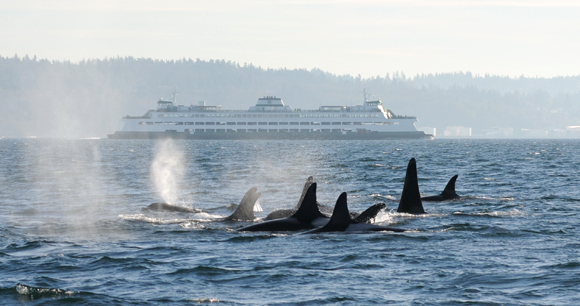As Sea Traffic Stalls, Oceans Grow Quieter
Ships carry over 90 percent of the world’s trade. Recent research conducted off the coast of British Columbia has found that reduced ship traffic due to COVID-19 shutdowns has led to a reduction in ocean noise and a resulting break for marine animals. Between January and April, a hydrophone station west of Vancouver Island (and near a major shipping route for container traffic) recorded a 16 percent decrease in noise power—or 1.5 decibels—compared to the same period of the year before. The pandemic has also cut down the use of explosives, seismic airguns, and military active sonar, further reducing noise levels.

Ship noise can have a severe impact on marine animals. Vocal mammals, including cetaceans, call in the low-frequency sound range, which overlaps with that of ship noise. This overlap can inhibit their communication, feeding, and threat avoidance. When noise levels are reduced, researchers expect animals to call more frequently and for their calls to be more complicated. Other marine animals, including fish and shrimp, can also be impacted by anthropogenic noise, with damage ranging from disturbance to hearing loss resulting in impacts in performance of their natural behaviors.
It is the first time since another human tragedy—the 9-11 terrorist attacks—that worldwide movement has drastically slowed down. Researchers around the world are seizing this rare opportunity to collect data and listen to the oceans. Such data will help us better understand the usual impacts of anthropogenic noise on the oceans, and perhaps spur efforts to dampen that impact in the future.
Program Terms: Marine Wildlife
AWI Quarterly Terms: Quick Read
Related News
North American Environmental Commission Confirms Mexico’s Role in Imperiling Vaquita
In Program: Marine WildlifeA commission under the United States-Mexico-Canada Trade Agreement (USMCA) released a report yesterday confirming that Mexico’s unwillingness to enforce its own wildlife protection, trade, and fisheries laws...
Captive dolphins face uncertain futures. They deserve better
In Program: Marine WildlifeIn this op-ed for the Tampa Bay Times, Dr. Naomi Rose, AWI’s senior scientist in marine mammal biology, discusses the challenges in caring for orcas...
Yahoo! Japan Sells Polluted Whale and Dolphin Meat Products to Unsuspecting Consumers
In Program: Marine WildlifeThe Animal Welfare Institute (AWI) and an international coalition of animal protection and environmental groups are calling on Yahoo! Japan and its parent company, the...
As Iceland Calls Off Fin Whale Slaughter, Japan and Norway Launch Cruel, Unsustainable Whale Hunting Seasons
In Program: Marine WildlifeJapan and Norway resumed slaughtering whales this month, while Iceland’s only fin whaling company has decided that it will not hunt this summer, citing a...